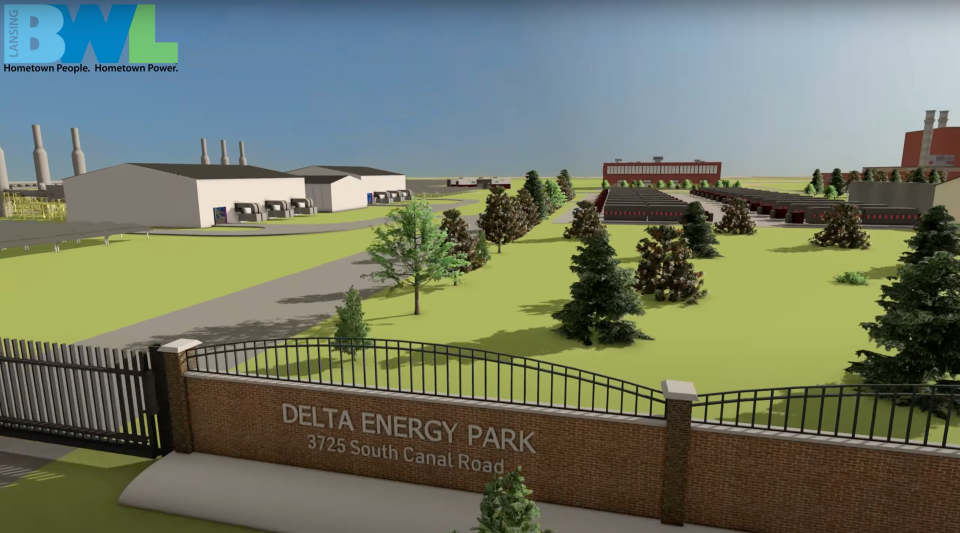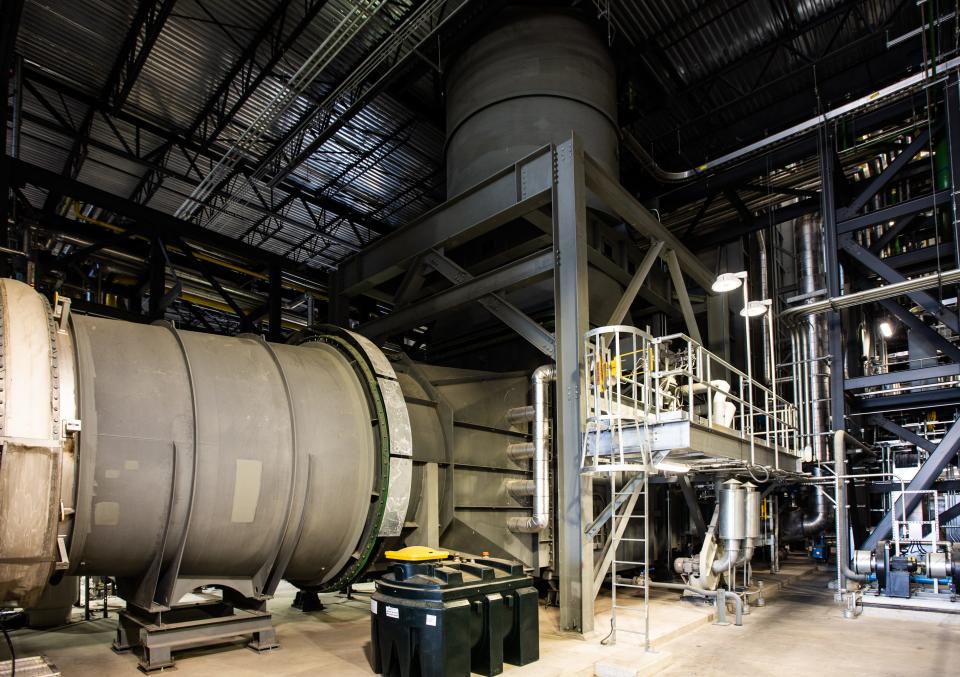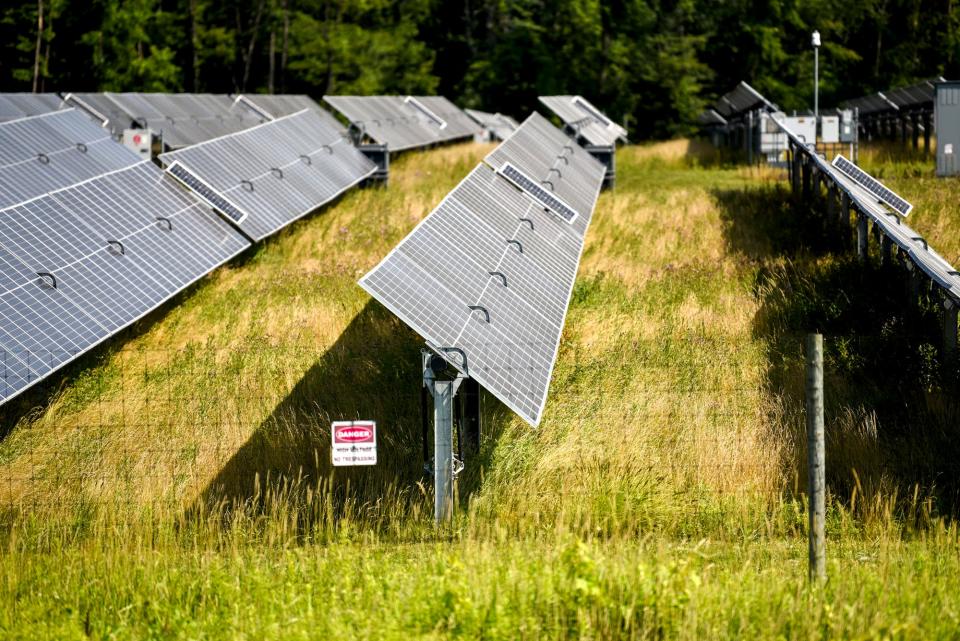BWL plans $750M investment in green energy over 10 years
LANSING — The Lansing Board of Water & Light has long said it intended to provide 50% clean energy and be carbon neutral by 2040. On Wednesday, the Lansing-owned utility outlined how it plans to do that.
The utility in a release said it plans broad-ranging investments in solar, wind and at least one new gas-fired electric generation plant in a $750 million plan over the next 10 years.
The utility currently can generate around 735 megawatts of electricity. The new plan, including projects that would produce 650 megawatts of renewable energy and a new gas-fired plant, would essentially double its current portfolio, said Amy Adamy, a spokeswoman for the utility.

"We're embarking on a $750 million project to build 650 megawatts of renewable energy," BWL General Manager Dick Peffley said during an interview at company headquarters. "It's very exciting. It puts us on a pathway to carbon neutrality by 2040 and keeps us as a leader in Michigan.
"That's a very, very tight goal: 2040. Most companies are talking about that. But we have a roadmap to get there and this is the start to it."
BWL said its plan would allow the utility to supply 16% of the state’s energy storage goal of 1,000 megawatts, as called for under Gov. Gretchen Whitmer’s “MI Healthy Climate Plan.” BWL currently supplies about 6% of the state’s total energy.
"We have over 200 megawatts of renewable energy and when we're done, we'll have 860 megawatts of clean energy," Peffley said. "Our goal was 50% clean energy by 2030. And we're on track to make that so that's a very aggressive goal, we're slightly ahead right now."
The expansion is expected to result in a 2.5% to 3% one-time rate increase, Peffley told the State Journal Wednesday. BWL would base any increase on the results of a 2024 rate increase study.
"We're going to bond for this project and spread the cost out over 20 years," Peffley said. "We expect to have a minor increase, this will not be sticker shock for our customers."
BWL board members approved rate increases for water and electric last fall, raising electricity rates 9% and water prices more than 18% over a two-year period. About half of those increases took effect Nov. 1 and the other half will take effect this fall.
Peffley said BWL, like other state utilities, is moving toward renewable energy goals and similar upgrades, and rate increases, should be coming across Michigan regardless of which utility customers use.
"Climate change is a real problem and we want to be out in front of this," he said.

The utility currently generates or provides a bit more than 200 megawatts of renewable energy. The expansion would add around 650 megawatts of renewable energy and would add what BWL officials believe would be the biggest battery storage facility for a utility in Michigan.
The plan would essentially double the utility's annual capital project spending for about a decade. BWL typically spends about $75 million on capital projects each year, and the plan calls for an average additional $75 million a year in new projects.
Among the utility's plans to produce an additional 650 megawatts of electricity, including four clean energy projects expected to be complete between 2025-2027:
160 megawatts of battery storage, 40 megawatts of which would be at the utility's Delta Energy Park, formerly the Erickson Power Plant. The rest is under negotiation and could be located in the utility's Lansing area footprint, Peffley said.
65 megawatts of local solar that would be on BWL land that is already, or nearly, zoned for industrial or energy operations.
195 megawatts of additional solar outside of the Lansing region
238 megawatts of wind outside of the Lansing region
A 110 megawatt reciprocating internal combustion engine gas plant at Delta Energy Park, to be completed by 2026, that would be used during peak energy demand
A possible additional gas plant at a location to be determined
The battery, wind and solar projects − like the others − are still pending contracts but Peffley said the projects have been in the works for about a year and he expects construction to start quickly.
"I'm ready to see dirt being turned, but I'm sure it'll take a few months," he said.
Some of the solar panels could be located where BWL used to keep its coal pile at the Delta Energy Park. The utility closed its last coal plant, the Erickson Power Station, in 2022.
“This is the largest planned growth in BWL’s nearly 140 year history and ensures we’re able to provide our customers with reliable and affordable energy for decades to come,” Peffley said.

The utility said it would continue to focus on energy waste reduction, as well as expansion into demand response programs for customers
The BWL has approximately 100,000 electric customers, 58,000 water customers, 155 steam customers and 19 chilled water customers.
Last summer, BWL celebrated the opening of its second natural gas-fired power plant, which went online in March 2022. That $500 million plan at the Delta Energy Park replaced the coal-fired Erickson station. Delta Energy Park generates 250 megawatts of electricity, while the Erickson facility produced 160 megawatts.
Officials said the plant’s construction was key to the area securing manufacturing investments, such as a $2.5-billion battery cell manufacturing facility, a joint venture between General Motors Co. and LG Energy Solutions Michigan Inc., announced in January.
Peffley said Ultium battery plant's power demands are about 30% of BWL's capacity, the utility can provide its current customers along with Ultium and the return of a third shift at a GM plant.
The additional capacity from new projects could be used to help recruit new businesses and excess power is sold to other utility companies, Peffley said.
BWL opened its first natural gas-fired power facility, the REO Town Cogeneration Plant, in REO Town in 2013. The REO plant produces both electricity (100 megawatts) and steam (300,000 pounds per hour) for the city, replacing four coal-fired boilers used for steam production supplied to city and industrial customers previously from Moores Park.
According to the Environmental Protection Agency, natural gas-fired plants significantly reduce the average rate of greenhouse gas emissions compared with coal-fired units. As of 2016, agency data showed that natural gas units emitted 898 pounds of carbon dioxide per megawatt-hour while coal-based units produced 2,180 pounds at the same rate.
BWL has existing solar. The utility owns the Cedar Street Solar Array, which can produce 150 kilowatts of energy. Another 50 solar panels are on the REO Town Headquarters roof, and can generate 13.5 kilowatts. The company buys electricity from Delta Solar, the largest tracking solar array project in Michigan located in Delta Township, which has 86,000 panels and when operating at maximum capacity, can power approximately 4,200 homes. BWL also buys about 80 megawatts of solar from the Assembly Solar array in Shiawassee County that went online in 2021. In 2019, BWL successfully launched the East Lansing Solar Park, which was partially funded by participating customers and allows those customers to earn billing credits, according to its website.
BWL’s first wind project was the Beebe Wind Farm, eight Nordex wind turbines in Ithaca. the turbines generate about 60,000 megawatt hours each year. BWL’s second wind project is the Pegasus Wind Farm in Tuscola County near Saginaw. That's BWL’s largest renewable asset and has a capacity of 68 megawatts.
"There's more to come, as we start developing the Delta Energy Park, there area lot of changes out there that you'll see," Peffley said.
Contact Mike Ellis at mellis@lsj or 517-267-0415.
This article originally appeared on Lansing State Journal: BWL plans $750M investment in green energy over 10 years

